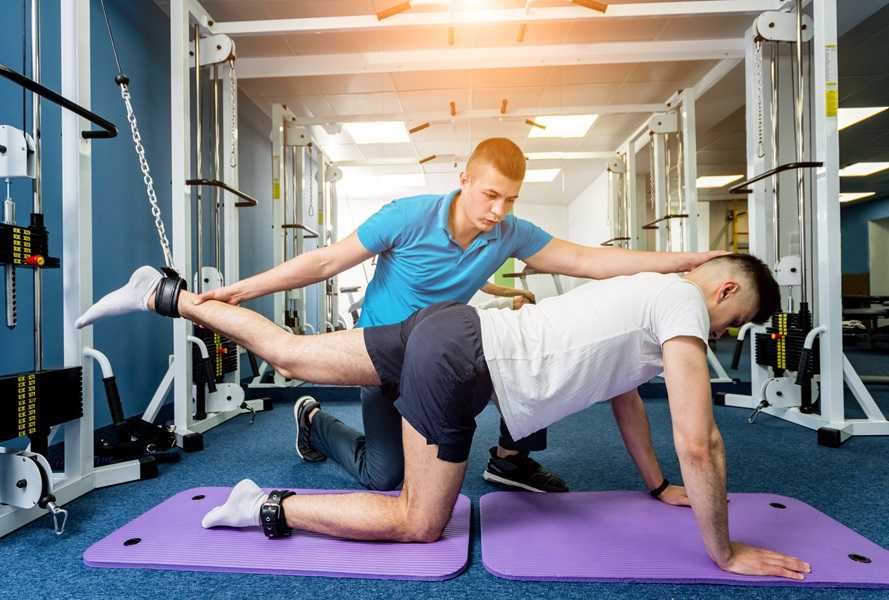
Expert Physiotherapy at Home
Certified physiotherapists visit you at home to provide focused, one-on-one care tailored to your needs. With no travel or waiting rooms, recovery happens in a setting that is comfortable, familiar, and built around your convenience.
Personalised Recovery Programmes
Every treatment plan is designed to suit your condition, goals, and pace. Our physiotherapists follow structured, evolving protocols to ensure consistent progress, with each session aligned to deliver meaningful results.
Trusted Physiotherapists. Real Results.
Our team comprises experienced, background-verified physiotherapists trusted by thousands of families. With a strong focus on safety, reliability, and clinical outcomes, we make recovery at home both effective and reassuring
Patient Testimonials
Portea Physiotherapists for Home Visits
Meet some of our experienced and dedicated healthcare professionals

Dr. Lokesh G
Physiotherapist
Specializations
Experienced in Neurological rehabilitation, Orthopaedic physiotherapy, and Paediatric care
Delivers structured, high-impact treatment plans across neuro, ortho, and paediatrics—ensuring safety, comfort, and measurable recovery at every stage.

Dr. Mohammed Sarwar
Physiotherapist
Specializations
Experienced in Neurological rehabilitation, Adult physiotherapy, and Paediatric care
Combines deep clinical expertise with a compassionate approach, supporting both adults and children through neuro and physical rehabilitation that promotes long-term independence and recovery.

Dr. Nelapati Divya
Physiotherapist
Specializations
Skilled in Orthopaedic rehabilitation, Manual therapy techniques, and Paediatric physiotherapy
Brings a personalised, hands-on approach to healing—combining structural expertise with paediatric sensitivity to restore movement, relieve pain, and improve everyday function.

Dr. Naveen V
Physiotherapist
Specializations
Trained in Pain management, Cardiac and Orthopaedic rehabilitation, Neurological care, and Neural tissue mobilisation
Brings clinical precision and empathy together—designing science-backed recovery protocols for pain relief, nerve mobilisation, and cardio-neuro-ortho rehabilitation across all age groups

Dr. Miloni Savla
Physiotherapist
Specializations
Holds an MPT in Orthopaedics with a focus on Musculoskeletal rehabilitation and strength recovery
Delivers focused, movement-oriented therapy grounded in orthopaedic science—helping patients rebuild strength, restore function, and return to daily life with confidence
Other Cities
Physiotherapy Treatments

what is avascular necrosis (avn)?
Avascular Necrosis (AVN), or osteonecrosis, is a progressive condition where the blood flow to the bone is interrupted, leading to bone tissue death. The most commonly affected joints are those that bear weight, such as the hips, knees, and shoulders. If left untreated, AVN can lead to joint collapse, severe pain, and significant mobility loss. Early intervention is essential to slow the progression of this condition and improve patient outcomes.
causes and risk factors of avn
AVN can develop from a variety of causes, including trauma, which damages the blood vessels that supply the bone. Prolonged use of corticosteroids, often prescribed for chronic inflammation, is another major contributor, as these medications interfere with bone health. Excessive alcohol consumption is also a risk factor, as it leads to fatty deposits in blood vessels, reducing circulation. Additionally, medical conditions like lupus, sickle cell anemia, and Gaucher’s disease are linked to a higher risk of AVN. Despite these known causes, some cases of AVN remain idiopathic, with no identifiable trigger.
recognizing early symptoms of avn
In its early stages, AVN symptoms may be subtle and are often mistaken for other joint-related issues. Patients might experience mild joint pain, stiffness, or discomfort that initially occurs only during physical activity. As the condition progresses, the pain becomes more persistent and severe, limiting movement and daily activities. Recognizing these early warning signs and seeking medical attention is crucial to prevent further deterioration of the joint.
importance of pre-surgical care in avn
Pre-surgical care is a critical aspect of managing AVN, as it helps to prepare the body and the affected joint for surgery. Effective pre-surgical care includes pain management through medications and lifestyle modifications, such as weight management and the cessation of smoking and alcohol consumption. A balanced diet rich in calcium and vitamin D is also vital for maintaining bone health.
Physiotherapy plays a pivotal role in pre-surgical care, focusing on exercises that strengthen the muscles around the affected joint while avoiding unnecessary stress. This not only alleviates pain but also helps preserve joint function, enabling better post-surgical outcomes.
how physiotherapy can help before surgery
Pre-surgical physiotherapy for AVN emphasizes maintaining joint mobility, improving muscle strength, and reducing stiffness. These tailored programs ensure that the joint and surrounding structures are in optimal condition before surgery.
how portea helps?
At Portea, we offer Physiotherapy at Home services to address a variety of health conditions. Our physiotherapy programs are tailored to support recovery from sports injuries and post-surgical rehabilitation, while also providing effective management for back pain, arthritis, shoulder pain, and slipped disc issues. For those with respiratory disorders like COPD, we focus on targeted breathing exercises that enhance lung function.
Additionally, our physiotherapists are experienced in neuro-rehabilitation for individuals recovering from stroke or managing paralysis, with specialized exercises designed to improve strength, balance, and mobility. With Portea, you can access professional, personalized physiotherapy in the comfort of your home, designed to enhance your quality of life.
Portea provides a range of services to support your health, including nursing care at home, nursing attendants at home, and options to rent or purchase medical equipment at home. We also offer home vaccinations, personalized diabetes care plans, mothers and baby care plans at home. Our goal is to deliver compassionate, tailored care right where you need it.
faq’s
Is there a treatment for avascular necrosis?
Yes, there are treatments available for avascular necrosis (AVN), depending on the severity of the condition. Early stages may be managed with conservative approaches such as pain relief through medications like NSAIDs, lifestyle modifications to reduce stress on the affected joint, and physical therapy to improve mobility. In more advanced cases, surgical options may be necessary.
Core decompression is a minimally invasive procedure where a portion of the bone is removed to relieve pressure, promote blood flow, and stimulate bone regeneration. Bone grafting can be used to replace damaged bone with healthy tissue. In severe cases, joint replacement surgery (such as a hip or knee replacement) may be required to restore function and alleviate pain. Early diagnosis and treatment are crucial in slowing the progression of AVN and improving outcomes. Consulting with a healthcare professional is essential for determining the most appropriate treatment approach.
How is avascular necrosis identified?
Avascular necrosis (AVN) is diagnosed through a combination of patient history, physical examination, and imaging tests. Here’s the typical process:
- Patient History:
The doctor will ask about symptoms like joint pain, risk factors (e.g., corticosteroid use, alcohol consumption, previous joint injuries), and any family history of AVN. - Physical Examination:
The doctor will check for signs such as joint pain, swelling, and reduced range of motion to determine which joint is affected. - Imaging Tests:
- X-rays: The initial imaging test, X-rays can reveal bone changes, but AVN may not appear in early stages.
- MRI (Magnetic Resonance Imaging): The most sensitive tool for detecting AVN, MRI can show early bone damage and reduced blood flow.
- CT Scan (Computed Tomography): A CT scan may provide detailed bone images in more advanced cases.
- Bone Scintigraphy (Bone Scan): Used in some cases to detect early bone changes related to AVN.
Which lifestyle factors contribute to the risk of avascular necrosis?
Certain lifestyle activities and habits can elevate the risk of developing avascular necrosis (AVN) by affecting blood flow to the bones or causing joint damage. These include:
- Heavy Alcohol Consumption:
Chronic alcohol abuse can impair blood flow to the bones, which may lead to bone tissue death and increase the likelihood of developing AVN. - Long-Term Use of Corticosteroids:
Prolonged use of corticosteroid medications, often prescribed for conditions like arthritis and inflammation, can interfere with blood circulation to the bones, particularly in areas like the hips, leading to AVN. - Smoking:
Smoking restricts blood flow and reduces the oxygen supply to tissues, including bones, which can contribute to the development of AVN. - Trauma or Joint Injuries:
Repeated trauma or fractures near a joint can disrupt blood flow, increasing the risk of AVN, particularly in weight-bearing joints.
What steps can be taken to prevent avascular necrosis?
Preventing avascular necrosis (AVN) primarily involves minimizing risk factors that can impair blood flow to the bones. Here are some preventive measures:
- Limit Alcohol Consumption: Reducing or eliminating alcohol intake can help maintain healthy blood circulation and lower the risk of AVN, as excessive drinking can restrict blood flow to the bones.
- Avoid Long-Term Use of Corticosteroids: If possible, work with a healthcare provider to manage conditions without prolonged corticosteroid use, as these medications can disrupt blood supply to the bones.
- Quit Smoking: Smoking reduces blood flow and oxygen delivery to the bones, increasing the risk of AVN. Quitting smoking improves overall circulation and bone health.
- Prevent Joint Injuries: Take steps to avoid joint trauma, such as using proper techniques in sports and wearing protective gear to reduce the risk of injury that could lead to AVN.
- Maintain a Healthy Diet and Exercise Routine:A balanced diet rich in calcium and vitamin D, along with regular low-impact exercise, helps keep bones strong and reduces the risk of AVN.
Is physical therapy needed before surgery?
Some patients may benefit from pre-surgery physical therapy to improve joint mobility and strengthen muscles, which can aid recovery post-surgery.
Doctor Consultation
Nursing
Physiotherapy
Trained Attendant
Elder Care
Mother & Baby Care
Lab Tests
Medical Equipment
Speciality Pharma
Critical Care




